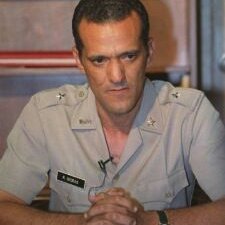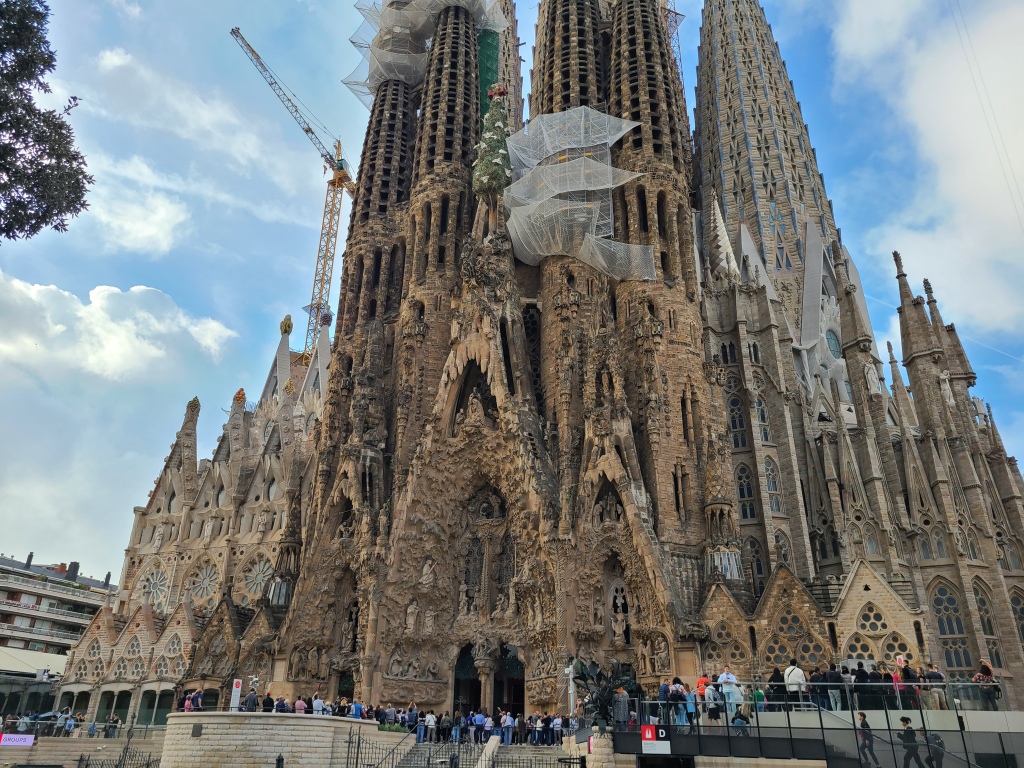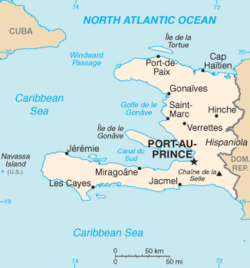
(Jean-Bertrand Aristide, centre, a former Catholic priest, won Haiti’s first free election in 1990 – he was removed in a coup in 1991)
The images out of Haiti that appear on the nightly news each day are horrible. Starving children, gang violence, lack of government control, and a society still reeling from recent earthquakes seem almost normal. Haiti is afflicted by constant gang wars fighting for control of Haitian cities, villages, and neighborhoods. It is important that a new novel that highlights these difficulties has been released. Ben Fountain’s fourth work, DEVIL MAKES THREE takes place in the early 1990s with Haitian instability at its height as a violent coup de’ état led to the overthrow of President Jean-Betrand Aristide’s government. The novel tells a fascinating story which is fictional, however, the background commentary lays out the terror of the daily existence of the Haitian people.
Fountain develops his novel focusing on American expat Matt Amaker who is forced to abandon his beachfront scuba business because of the chaos that dominates the Caribbean country. Amaker will team up with his friend Alix Variel, a member of a prominent Haitian family, and a partner in the defunct scuba business to pursue priceless treasures rumored to be buried on historical shipwrecks off a remote section of Haiti’s southern coast. Admirers of the work of Joseph Conrad, Graham Greene and John Le Carrie should see similarities in Fountain’s approach as he develops this deeply humane political thriller.

The novel opens with the 1991 coup in full swing. The coup resulted from the first democratic election in Haiti’s history as Aristide, a populist Catholic priest was elected president of Haiti. Aristide, a member of the National Front for Change and Democracy party, was one of the only church figures to speak out against the repression that existed under the dictatorships of the Duvalier family. Aristide’s populist Lavalas movement which advocated the use of legislation and popular mobilization as vehicles for economic reform , an end to corruption, and justice for victims of the Haitian military and the Tonton Macoutes, (a Haitian paramilitary and secret police force created in 1959 by dictator François “Papa Doc” Duvalier) earned 67.5% of the popular vote. Since Aristide’s program threatened the power of some of the Haitian elite, many of which were supporters of the Duvalier’s and the Haitian military it is not surprising that his election was soon negated. The coup took place on September 28, 1991, and was led by General Raoul Ceras and the Haitian army. The military immediately targeted pro-Aristide officials, rural and peasant organizations, neighborhood and community associations, and trade unions. The press and radio stations were soon silenced. Because of human rights abuses over 14,000 Haitian refugees arrived at Guantanamo seeking asylum.
As Fountain’s novel evolves the reign of terror of the Haitian military and gangs seem to permeate each scene. As he proceeds Fountain provides an insightful description of Haitian politics and society with poverty, corruption, and violence on full display.
Fountain introduces a number of important and interesting characters as the novel progresses. Alix who convinces Matt to move to Haiti from the United States to set up a scuba business on land owned by his family and led by its matriarch Lena Varie plays a significant role. Audrey O’Donnell aka. Shelly Graves is a “clandestine service trainee” who arrived during the coup as an assistant political attaché as her CIA cover. Graves will fall in love with Alix creating a rather unusual relationship. There is Tommy Rittenhouse who runs the Kokiyaj Beach Resort; Dr. Jean-Hubert Laroque who operates his family’s hospital which has existed in Haiti for generations; Misha Variel, a Ph. D candidate in French literature at Brown University who Matt adores; General Romeo Concers, second in command during the coup; Sonia Delambre, the mistress of Colonel Rene Delvas and a CIA asset; Charles Durham “CD” Nelms who helped finance the treasure hunting scheme and then abandoned Matt and Alix; and a host of other characters that remind one of Conrad, Greene, and Le Carrie.
The role of the CIA is important as Chief of Station Lorenz and his people grew concerned that Matt and Alix would discover gold and silver which would be seized by the Haitian army and used to stabilize its dictatorial regime. This scenario was complex because Shelly and Alix’s affair will end, and she is distraught. An undercurrent throughout is the role of the US government as people wonder if newly elected President Bill Clinton will allow boat people into the United States, a departure from the policies of the Bush administration. Fountain integrates American duplicity, support for corporate interests, and in effect the exploitation of the Haitian people on a daily basis.
Employing Matt’s expertise, Fountain leads the reader through the deep exploration of the Haitian coast in search of treasure located in Anse Serrat. Matt is convinced there are bronze cannons, gold, and silver inside a shipwrecked Spanish galleon. Fountain describes the intricacies of mapping the site, the types of tools used and other equipment in minute detail. If you are a scuba aficionado, this book is for you! In addition, Fountain describes flora, coral, and aquatic life as Matt’s team uncovers evidence of the Philippvs crest on one of the canons.
There are many layers to Fountain’s story. There is the everyday existence of the Haitian people. Starvation, poor or no medical care, murders and political assassination along with the seizure of private property by coup leaders, and little or no income for families who live in uninhabitable homes pervade the novel. The importance of vodou also dominates the story through constant references and the role of Duvie, a Vodou priest who tries to educate Matt and others of the importance Vodou plays in the lives of ordinary Haitians.
As the novel evolves it is clear that coup leaders like General Concers are obsessed with the 500th anniversary of Columbus’ voyage and want Matt to locate the shipwrecked Santa Maria which would enhance his regime’s reputation. This places Matt, Alix, and others in a precarious position as Concers requests are more like demands with consequences if they are not met. At the same time Shelly, who thinks she knows everything through her sources, works to install a government that favors American interests.
Francine Prose writes in her New York Times review and succinctly gets to the core of Fountain’s novel writing, “Not only a skillful author, but a brave one, Fountain is drawn to difficult subjects. An earlier novel, the award-winning BILLY LYNN’S LONG HALFTIME WALK featured a damaged veteran of the Iraq war who was promoted, by the news media, as a conquering hero. It takes courage to set an extremely complicated work of fiction in Haiti, to write across the lines of class, color, gender, ideology and nationality. And it’s nervy to blow the whistle on how the C.I.A. has engineered regime changes worldwide, often with disastrous results.

(General Raoul Cedras, Haitian military dictator)
Over 500 pages long, the novel has its slow spots. Some readers may be more interested than I was in the specs of diving equipment. Others may question why so much of the book is devoted to Matt and Alix’s harebrained plan to solve their money woes by finding sunken treasure off the Haitian coast. When a fabulously awful character, Davis, seems to wander in from an Elmore Leonard novel — ‘Someone needed to slap a warning on his forehead: Contents Under Pressure’— you can’t help wondering why Matt and Alix (neither of them fools) believe they can do business with him or with the rich, sketchy owner of the ship from which they dive in search of gold. But it all makes perfect sense when we realize that, during a time of lawlessness, a historically significant and potentially lucrative treasure hunt is just another ScubaRave, on steroids.
Given the thrum of political anxiety that keeps many of us awake at night, some readers might think: The last thing I need right now is a novel about a crisis that has worsened over time in one of the world’s poorest nations. I understand the sentiment, but I was grateful for the old-fashioned pleasure of immersion in a long book with engaging characters, a sense of history and place, and a multifaceted vision of people trying to figure out what to do when the world around them is changing.”*
- Francine Prose, “Treasure and Trouble,” New York Times Book Review, October 15, 2023, p. 18.

(Port Au Prince circa 1992)

